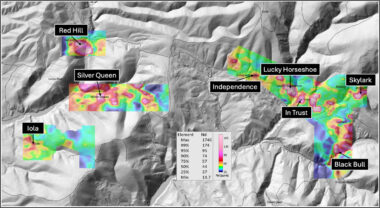Results at a glance:
- NSW rural confidence remains unchanged from the first quarter of the year.
- Fewer farmers are concerned about falling commodity prices and rising input costs this quarter, however, drought and rising interest rates were cited as a worry by an increasing number of farmers.
- Farmer investment intentions have declined.
Fewer New South Wales farmers are concerned about falling commodity prices and rising input costs this quarter, however, drought and rising interest rates were cited as a worry by an increasing number of the state’s farmers, the latest quarterly Rabobank Rural Confidence Survey has shown.
The survey, released today, found farm sector sentiment in the state had remained unchanged in the latest quarter, after a combination of concerns about softening commodity prices, higher interest rates and dry conditions saw confidence slip in the first quarter of 2023.
Rabobank regional manager for Central and Northern NSW Toby Mendl said farmers’ concerns about softening commodity prices, higher interest rates and drier conditions in some parts of the state ate away the positivity generated by recent good agribusiness conditions – after back-to-back years of good seasonal conditions and often record commodity prices.
The survey, completed last month, found respondents who expect the agricultural economy to worsen were less concerned about falling commodity prices (60 per cent, down from 68 per cent previously) and rising input costs (26 per cent, down from 29 per cent previously). However other concerns increased with 30 per cent of NSW farmers now nominating drought (up from 19 per cent) and 24 per cent nominated rising interest rates (up from 20 per cent) as reasons for pessimism. Just under half (49 per cent) of NSW farmers surveyed believed agricultural business conditions would remain stable (down slightly from 50 per cent last quarter).
Mr Mendl said, after seeing confidence slip in the first quarter of the year, it’s not unexpected that farmers are taking time now to evaluate the situation this quarter, as operating conditions returned to more average settings. “There is a sentiment amongst farmers that they have enjoyed three good years – in terms of rainfall and season – and they are now due for more average weather conditions,” he said.
“While there is growing concern about a return to drier seasonal conditions, much of New South Wales is well positioned for the year ahead, having enjoyed quite a wet April, particularly in eastern areas. However, there are parts of the north west of the state and pastoral zones that have missed out on rain and that is reflected in the survey – with over half of the farmers in those areas concerned about the return of drought conditions,” he said.
The survey found the largest decline in confidence to be observed within the state’s grain sector – with 48 per cent expecting economic conditions to worsen in the year ahead (up from 36 per cent last quarter) and only eight per cent expecting an improvement (compared with 12 per cent previously).
Easing commodity prices were identified as the chief concern by 57 per cent of grain producers who had a negative view on the coming 12 months (down from 64 per cent last quarter).
“There are a lot of grain growers with canola currently stored on-farm who will be disappointed by the easing prices,” Mr Mendl said
“Despite concerns about prices,” he said, “grower’s confidence has been buoyed by good soil moisture profiles across much of the state – setting growers up for the season ahead albeit noted that some areas are still waiting for some pre-sowing rain to link up the good base of sub-soil moisture to planting depths”.
“NSW grain growers have experienced some challenging harvests in recent years, with lengthy delays in getting the crop taken off due to extremely wet seasonal conditions across much of the state. While the above average rainfall delivered high yielding crops, wet conditions made it difficult for farmers to get into the paddocks to harvest these crops. More average seasonal conditions predicted for 2023 may mean farmers can look forward to more normal harvest conditions later in the year.”
This quarter, 37 per cent of NSW beef producers surveyed believe the economic conditions would worsen in the coming 12 months (slightly down from 38 per cent last quarter), while 16 per cent are expecting business conditions to improve – up from 11 per cent previously. And 44 per cent of growers are anticipating conditions to remain unchanged.
“While cattle prices have eased this year, this had been expected for quite some time, and producers with breeding stock are still in a good position,” Mr Mendl said,
“Cattle producers are not surprised by the correction, just disappointed the record high prices could not continue – there is still money to be made at current prices”.
Sheep producer confidence across NSW has increased slightly this survey, with the majority of producers expecting farm business conditions to improve or remain the same.
And like the beef sector, concern about easing commodity prices was the key driver of declining confidence in the sheep sector, cited by the majority of producers reporting a pessimistic outlook.
For the cotton sector, Mr Mendl said, “Whilst the season has had its challenges given a wet and mild start, most valleys are showing sound yields around or slightly above average, while the southern valleys, south of Griffith, are below average.”
The survey found the majority of NSW cotton producers are expecting agricultural economic conditions to remain stable this quarter.
Investment intentions amongst NSW farmers have fallen this quarter, down from 30 per cent of farmers expecting to increase the total investment in their farm business over the next 12 months, to 22 per cent holding that intention this quarter.
Mr Mendl said farmers are looking at “conserving cash-flow”, as they factor in rising interest rates and easing commodity prices and are re-evaluating business spending.
“Farmers are winding back on the big-ticket investment projects, but they are still comfortable investing in key on-farm infrastructure that drives productive capacity.”
More farmers are looking to invest in adopting new technologies (45 per cent, up from 37 per cent), increasing labour (31 per cent up from 21 per cent) and participation in education opportunities (30 per cent, up from 20 per cent).
Of those farmers looking to increase their investment, the number looking to purchase additional property has fallen from 28 per cent last quarter to 16 per cent in this quarter.
“Some apprehension on the current season, squeeze in margins with rising costs and the increase in property prices is having an impact on farmer appetite to expand their businesses through property purchases at present,” Mr Mendl said.
A comprehensive monitor of outlook and sentiment in Australian rural industries, the Rabobank Rural Confidence Survey questions an average of 1000 primary producers across a wide range of commodities and geographical areas throughout Australia on a quarterly basis.
The most robust study of its type in Australia, the Rabobank Rural Confidence Survey has been conducted since 2000 by an independent research organisation. The next results are scheduled for release in September 2023.
<ends>
Media contacts:
Denise Shaw Will Banks
Media Relations Media Relations
Rabobank Australia & New Zealand Rabobank Australia
Phone: 02 8115 2744 or 0439 603 525 Phone: 0418 216 103
Email: [email protected] Email: [email protected]
About us:
Rabobank Australia & New Zealand Group is a part of the international Rabobank Group, the world’s leading specialist in food and agribusiness banking. Rabobank has more than 120 years’ experience providing customised banking and finance solutions to businesses involved in all aspects of food and agribusiness. Rabobank is structured as a cooperative and operates in 38 countries, servicing the needs of more than nine million clients worldwide through a network of more than 1000 offices and branches. Rabobank Australia & New Zealand Group is one of Australasia’s leading agricultural lenders and a significant provider of business and corporate banking and financial services to the region’s food and agribusiness sector. The bank has 90 branches throughout Australia and New Zealand.


